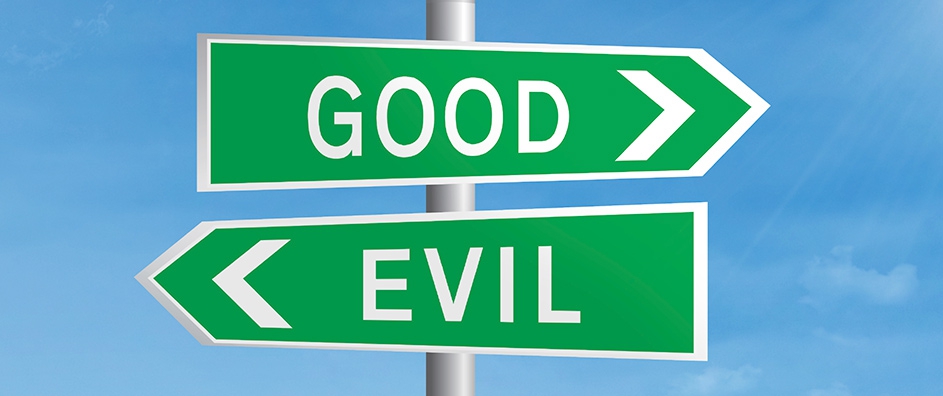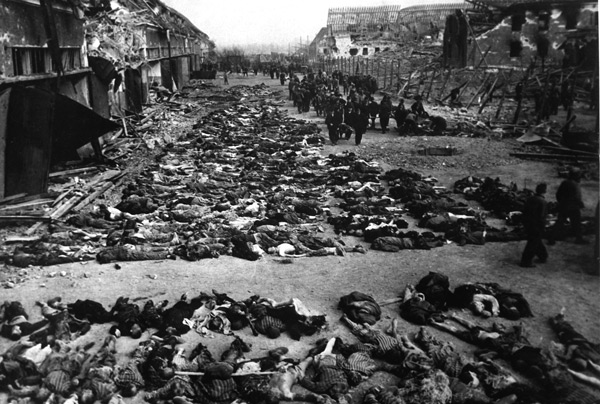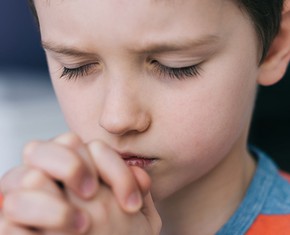The views expressed in our content reflect individual perspectives and do not represent the authoritative views of the Baha'i Faith.
In the previous article in this series, we reflected on spiritual responses to the suffering caused by natural events. Now, let’s turn our focus to those events where human beings themselves cause terrible suffering. I’ll call this “extreme evil”.
I was only 10 years old when I watched a British TV documentary series titled “The World at War”, which focused on WWII. Each episode told the story of specific events during those terrible years: the main war campaigns, life in Germany and in Britain, the atrocities that occurred in occupied countries, etc. One particular episode titled “Genocide” focused on the implementation of the Nazi’s “Final Solution” and the death camps. Seeing bulldozers pushing piles of bodies into mass graves shocked me so deeply that in the evening I could not eat anything at dinner. It was my first contact with “extreme evil.”
Several films, documentaries and books have given us a fairly complete description of the horrors of the Holocaust. Of all descriptions and testimonies I’ve found, here’s one written by a Catholic priest, Father Eloi Leclerc:
I was in Buchenwald and Dachau. There I lived the immense horrors of inhumanity. A true descent into hell in the middle of thousands of people slaughtered like cattle. There, I experienced the silence of God in face of so much evil, so much pain, unjust suffering, contempt for human life, so much death. Those who have not gone through this experience cannot even imagine what that is. It is the moment of absolute silence of God, of His absence. I could raise my eyes to heaven, but the heaven did not respond. The crying did not reach there. Then I realized that one could well be an atheist. This is a serious question for a believer. How to believe in the God of Love, after Auschwitz, Dachau, Buchenwald? Faced with such a misery, loneliness and suffering can we still believe in the God of Love?
This question, which highlights the pivotal point of Theodicy, challenges us all.
A previous article in this series defined “evil” as human actions committed with the deliberate purpose of inflicting grief. But every human being, as the Baha’i teachings tell us, has free will–each of us has a choice whether to commit good or bad deeds:
But in the choice of good and bad actions he is free, and he commits them according to his own will. For example, if he wishes, he can pass his time in praising God, or he can be occupied with other thoughts. He can be an enkindled light through the fire of the love of God, and a philanthropist loving the world, or he can be a hater of mankind, and engrossed with material things. He can be just or cruel. These actions and these deeds are subject to the control of the will of man himself; consequently, he is responsible for them. – Abdu’l-Baha, Some Answered Questions, p. 248.
Reflecting on the extreme evil people commit can lead us to question the existence of any comparable good in the world. But even the history of the Holocaust has its share of powerful examples of courageous and selfless acts, when good people saved others by risking their own lives. In fact, the world’s response to those atrocities demonstrates an amazing example of a unified commitment to stop such extreme evil and prevent it from recurring.
It seems logical to ascribe the extreme evil people commit to human wickedness and degradation. Such overwhelming events may be so horrific that we immediately conclude they did not bring any benefit to mankind. But extreme evil events require us to reflect on two important questions:
How could this happen?
How can we prevent it from happening again?
If we fail to reflect on these questions, and act based on that reflection, then we know such extreme suffering may manifest itself over and over.
So how do the Baha’is view such extremely evil events; and believe the world can prevent them in the future? The Guardian of the Baha’i Faith, Shoghi Effendi, described the phenomenon of extreme evil as the “death throes of the old world order,” dominated by forces like nationalism and racism, and destined to be replaced by a new world order patterned on the Baha’i teachings of unity, global government and international cooperation. He characterized our era as an “age of transition,” between the current conflict-intensive system of national sovereignty and a new, more spiritually-minded epoch of peace, harmony and unification; all part of the “… simultaneous processes of rise and fall, of integration and disintegration, of order and chaos, with their continuous and reciprocal reactions on each other …” – Shoghi Effendi, The Advent of Divine Justice, p. 72.
From a Baha’i perspective, these extreme evil events, vast and tragic as they may be, cannot be seen as isolated episodes in recent human history. In parallel with these calamities, other ongoing positive initiatives concurrently contribute to building a more secure and peaceful world for all mankind. Despite the extensive media coverage of conflicts, wars and atrocities, statistics show that our planet is becoming less violent.
In this world made of nation-states, whose fractious relations institutionalize conflict and defense of national interests, we can now begin to witness the gradual growing of a united world, a new world order based on cooperation and the common interests of all humanity.
You May Also Like
Comments


















Thanks for comment.
Something we can also say about this issue is that evil (and extreme evil) are not an issue of shared responsibility between God and the human being. Human beings are free to make choices and moral option. Therefore, only the human beings are to be blamed for evil acts.
Baha’i greetings,
Marco
We must be of the same vintage for that same series on WW2 turned me into an ardent atheist at the age of 9
The Nazi's acts and the priest's observations have turned half of the western world into atheists: “Since the Holocaust and because of it we don’t go there,” is not a rare agnostic response today; or more assertively, its unspeakable suffering is proffered as proof that God is non-existent, uncaring or irrelevant. The casual observer underestimates the dangers of atheism
Actually, it's child's play for Baha'is to prove from a rational stance if not ...based on scientific logic that God exists.
As you say in more scholarly terms than I:
it’s not our job to hold God responsible for His doings. The boot is actually on the other foot. Only those who have joined partners with God insist for example that He was grossly wrong to allow the Holocaust. Theodicy for them is a dead letter. Leave them to themselves and pray for the progress of their souls. Our collective responsibility is to unmask the wickedness of the evil Nazi’s, to bring them to justice, to commiserate with the survivors; more importantly - help the victims and most importantly - permanently prevent similar atrocities that persist into our time.
In the cold light of logic the signs of man’s cruelty to man, or even natural disasters, no more disprove the existence of God than centuries of putatively idyllic life in a tropical paradise apparently prove His presence there.
Baha'i love
Paul
corporations. Most canadian citizens seem to be quite happy to allow the corporations to take the country. the government took the protection off our water so that these foreign corporations could take it and no one seems to mind except for a few and most of these are first nations people. We desperately need a government at the world ...level in order to control the corporations.
Thanks for your comment.
Here in Portugal, there was a bank (and several corporations) who used to give financial support to the main political parties. Any Portuguese government used to obey to that bank (and those corporations). Recently that bank filed for bankruptcy and now we are discovering many “weird” businesses between Portuguese government and that Bank and those corporations.
In this country, people don’t believe in their representatives; people are suspicious about politicians; people don’t trust the government. Trust has to be rebuilt. Without trust, the gap between politicians and common citizens will open wider, and the ...country will become unmanageable.
Any form of government (local or national) needs people’s trust. A system of world governance alone will not solve international problems unless it has the trust of peoples of the world.
Baha’i greetings,
Marco